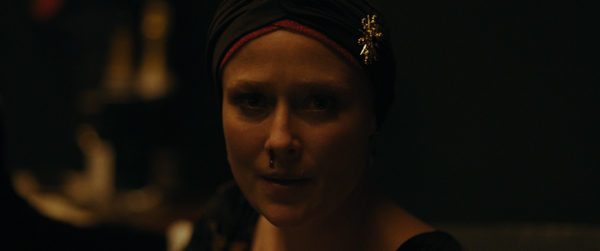




Dir/Wri: Rose Glass | Cast: Morfydd Clark, Jennifer Ehle, Lily Frazer, Lily Knight, Marcus Hutton, Turlough Convery, Rosie Sansom, Carl Prekopp, Jonathan Milshaw, Noa Bodner, Rosie Sansom | UK, Fantasy Drama 84′
Rose Glass has been making films since she was 13. Her accomplished first feature is a restrained brew of horror and psychological thriller built round intoxicating performances from Morfydd Clark and Jennifer Ehle as nurse and patient.
The real St Maud lived in 10th century Germany, the daughter of a Saxon nobleman known for her healing hands, but this Maud has a distinctly Welsh sensibilities. Clark is clearly cast for her angelic face, although we see her with fresh blood on her hands in the opening scene which suggests that she is not as pious as she would have us believe when she arrives at the Arts&Crafts villa of a surprisingly vivacious diva who is dying of cancer.
Amanda (Ehle) is clearly not going to “go gentle into that good night” in the words of Dylan Thomas. Fond of Art Deco prints, mid-Sixties furniture and the music of Al Bowlly, Ehle dusts down her purring North Carolina accent and often dons a wig and false eyelashes to create a ravishing portrait of faded glamour which echoes Dorothy Parker or even Cyd Charisse. Bored rigid by her own mortality, and relying on her lover Carol (Frazer) to entertain her, Maud responds by stroking her ego, as a tender nurse whose new found religious fervour reaches orgasmic levels, inspiring both patient and carer to hope for better things in the next life – saved by the power of God. But Maud is jealous of Carol, and her tenure ends in tears. This elegantly crafted first act is bewitched by the squally winter skies of Scarborough, Adam Janota Bzowski’s booming sensaround soundscape and lush lensing from Ben Fordesman.
Once Ehle has left the stage (she does return for a brief blast) the film turns into a rather more disturbing study of untreated mental illness, Glass directing with inventive flourishes clearly influenced by The Devils and Repulsion. Maud is a disturbed and delusional character suffering from loneliness and a desperate need to control, and clinging to her Christian faith and its emblems for succour. And we really feel for her in this astonishing turn from Clark.
It soon emerges from a chance encounter in the street that she was previously known as Kate, and worked in a hospital where something bad happened. Now offering palliative care through a private agency, Maud has poetically re-styled herself as a contemporary version of Florence Nightingale, and Glass has given clever thought to this imaginative re-branding: Maud is also dogged by dangerous moods and these sequences are accompanied by magic realism and glowing special effects – in one Maud sprouts luminous wings, another sees her incandesce in a really shocking finale.
Maud’s delusional episodes grow increasingly florid as she finds herself alone and unemployable in a dingy basement flat. By the end the reality and fantasy become indistinguishable although this ambiguity never entirely satisfies. But Glass clearly enjoys honing her beast and adding further layers of texture to a characterisation that has haunting implications. Ehle is sadly underused but makes the best of her tortured diva in this really frightening first foray for the British director. MT
IN CINEMAS 9 OCTOBER 2020